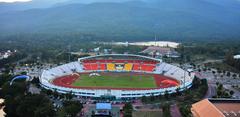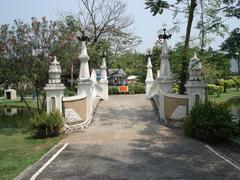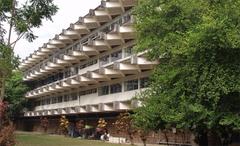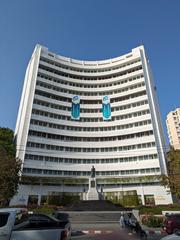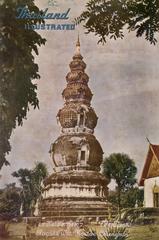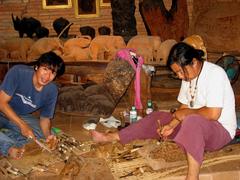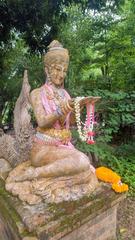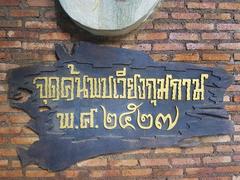Dara Academy Chiang Mai: Visiting Hours, Tickets, and Historical Site Guide
Date: 04/07/2025
Introduction
Dara Academy, nestled in the heart of Chiang Mai, stands as a beacon of educational progress, cultural preservation, and historical significance in Northern Thailand. Since its founding in 1878 by American Presbyterian missionaries Dr. Daniel and Sophia McGilvary, Dara Academy has played a pivotal role in shaping the region’s academic and social landscape. Originally the first school dedicated to girls’ education in Northern Thailand—a groundbreaking move at the time—the academy has since evolved into a coeducational institution renowned for its rigorous academics, bilingual curriculum, and commitment to community engagement (Dara Academy Official History; Chiang Mai History).
With its historic colonial-era wooden buildings, vibrant campus life, and deep roots in Lanna tradition, Dara Academy offers a unique visitor experience. Whether you are a historian, a prospective student, or a cultural explorer, this guide will help you discover the academy’s heritage, understand its visitor policies, and make the most of your trip.
Table of Contents
- Introduction
- Historical Overview
- Founding and Early Development
- Missionary Influence and Educational Reform
- Expansion and Coeducation
- Architectural and Cultural Heritage
- Women’s Empowerment Legacy
- Modernization and Internationalization
- Community Engagement and Social Impact
- Preservation of Historical Legacy
- Role in Chiang Mai’s Educational Landscape
- Academic Programs and School Reputation
- Cultural Activities and Community Outreach
- Campus Life and Facilities
- Admissions and Tuition
- Visiting Dara Academy: Hours, Tours, and Tickets
- Dara Academy Monument
- Visitor Access, Security, and Etiquette
- Language and Communication
- Events and Activities
- Facilities and Amenities
- Photography and Privacy
- Best Visiting Periods
- Frequently Asked Questions (FAQ)
- Contact Information
- Visual and Digital Resources
- Further Reading and References
- Conclusion and Call to Action
Historical Overview
Founding and Early Development
Dara Academy was established in 1878 by Dr. Daniel and Sophia McGilvary, American Presbyterian missionaries who played a vital role in introducing modern education to Northern Thailand. Their vision was to provide quality education to girls in an era when formal schooling was reserved primarily for boys and conducted in Buddhist temples (Dara Academy Official History). The school, originally known as “The Girls’ School,” paved the way for gender-inclusive education in the region.
Missionary Influence and Educational Reform
The academy’s foundation coincided with Chiang Mai’s gradual opening to Western influence after the Bowring Treaty of 1855, which introduced foreign trade and missionary activities to the Lanna Kingdom (Chiang Mai History). Dara Academy’s curriculum initially emphasized literacy, arithmetic, sewing, and Christian values, later expanding to include science, mathematics, and languages. Despite early resistance, the school gained the support of local rulers and became a model of educational reform (Presbyterian Missionary History).
Expansion and Coeducation
Transitioning from an all-girls institution, Dara Academy began admitting boys in the mid-20th century, reflecting social change and the growing demand for quality education for all. The school now serves over 7,000 students from kindergarten through high school and is known for its bilingual instruction in Thai and English (Dara Academy Facts).
Architectural and Cultural Heritage
Dara Academy’s campus is a harmonious blend of historic colonial-era wooden buildings and modern facilities. The original schoolhouse, with its intricate woodwork and colonial design, is preserved as a heritage site (Chiang Mai Heritage). The academy is also a center for the preservation and celebration of Lanna traditions, incorporating Northern Thai music, dance, and crafts into its curriculum.
Women’s Empowerment Legacy
From its inception, Dara Academy has championed women’s empowerment, providing opportunities for girls to become educators, nurses, and community leaders (Women’s Education in Thailand). Its legacy continues as the school promotes female leadership and broadens access to quality education.
Modernization and Internationalization
Today, Dara Academy offers a diverse selection of academic programs, including a sought-after English Program (EP) that attracts both Thai and expatriate families (Dara Academy International Programs). The school participates in international networks, fostering exchanges and collaborative projects.
Community Engagement and Social Impact
Dara Academy’s commitment to service extends beyond the classroom. The school is active in community outreach, charity efforts, and environmental campaigns, and boasts an alumni network of influential leaders (Chiang Mai Heritage Initiatives).
Preservation of Historical Legacy
Archives of historical documents, photographs, and artifacts are maintained to preserve Dara Academy’s legacy. The school also participates in heritage initiatives to protect its historic buildings and cultural resources.
Role in Chiang Mai’s Educational Landscape
Dara Academy has played a central role in Chiang Mai’s transformation into an educational hub, promoting gender equality and cross-cultural understanding.
Academic Programs and School Reputation
Dara Academy provides education from kindergarten to secondary level, integrating the Thai national curriculum with international standards. At higher levels, it adopts the British system, preparing students for IGCSEs and A-levels (ASEAN Now Forum). The English Program is particularly popular among local and expatriate families, offering a quality English-medium education at a more accessible cost compared to international schools. Annual tuition averages 153,000 THB, with a 5% discount for advance payment.
Students excel academically, consistently gaining admission to leading universities both in Thailand and abroad. The school’s commitment to holistic education is evident in its strong extracurricular offerings and its focus on student leadership and service.
Cultural Activities and Community Outreach
Dara Academy is deeply engaged in promoting Lanna culture and traditions. Students participate in local festivals, art and music competitions, and community projects that celebrate Northern Thai heritage (Dara Academy Facebook). The school celebrates Thai and international festivals such as Loy Krathong, Chinese New Year, and Christmas, fostering multicultural understanding.
Campus Life and Facilities
Centrally located on Kaew Nawarat Road, Dara Academy’s campus features classrooms, science and computer labs, sports fields, and a chapel. Historic buildings coexist with modern facilities, creating a unique learning environment (ASEAN Now Forum). Students enjoy a variety of clubs and activities in music, drama, debate, and community service. A school bus service (12,000 THB/year) operates across Chiang Mai.
Admissions and Tuition
Admissions requirements vary by grade and program. Prospective families should contact the admissions office or visit the school’s website for up-to-date information on the application process, entrance exams, and scholarship opportunities. Tuition is around 153,000 THB per year, with discounts for advance payment. Additional costs may include uniforms, activities, and transportation.
Visiting Dara Academy: Hours, Tours, and Tickets
Dara Academy is primarily a school, but welcomes visitors interested in its history and culture. The campus and historic buildings can be visited by appointment, especially during cultural festivals and open house events.
- Visiting Hours: Monday to Friday, 9:00 AM – 4:00 PM (excluding public holidays and school breaks)
- Admission: Free; donations for preservation are welcome
- Guided Tours: Available by advance booking; English- and Thai-speaking guides can be arranged
- Accessibility: Ramps and accessible restrooms available in most areas; some historic buildings may have limited access
For guided tours or group visits, contact the school’s administrative office in advance (Dara Academy contact).
Dara Academy Monument
Historical and Cultural Significance
The Dara Academy Monument, located in the Nong Pa Khrang area, commemorates the school’s founding and its role in regional educational development. The monument features traditional Lanna architectural design and serves as a focal point for school celebrations and public remembrance (Official Dara Academy Website).
Visiting Information
- Hours: Daily, 8:00 AM – 5:00 PM
- Admission: Free
- Guided Tours: Available upon request; arrange via the school’s administrative office
Tours and Special Events
The monument is featured in school festivals and special events such as anniversaries and Songkran. These occasions often include traditional performances and community activities.
Accessibility and Amenities
The monument is wheelchair accessible, with paved paths and ramps. Visitor centers staffed by bilingual personnel, restrooms, and refreshment kiosks are available nearby.
Nearby Attractions
The monument is close to other historical sites such as San Pa Koi Mosque, Prince Royal’s College, and Chiang Mai Railway Station, making it easy to plan a broader cultural itinerary.
Travel Tips
- Dress modestly in respect for local customs
- Best visited from November to February for cooler weather
- Photography is welcome outdoors; ask for permission before photographing indoor activities
Visitor Access, Security, and Etiquette
All visitors must check in at the administration office and present identification. Access to classroom and administrative areas is restricted during school hours. Modest attire is required, and shoes may need to be removed in certain buildings. Security staff are present throughout the campus.
Language and Communication
While Thai is the primary language, English-speaking staff and guides are available. To ensure a seamless experience, especially for non-Thai speakers, it is advisable to arrange for an English-speaking guide ahead of your visit.
Events and Activities
Dara Academy hosts a variety of annual events, including academic competitions, alumni reunions, and cultural festivals showcasing traditional Northern Thai music, dance, and crafts (Dara Academy vision).
Facilities and Amenities
The campus is equipped with modern classrooms, science and computer labs, a sports complex, and a well-stocked library housed in a historic building. Canteens and restrooms are available; visitors should bring personal items like tissues or hand sanitizer.
Photography and Privacy
Photography is permitted in public areas and during events. Please seek permission before photographing individual students or classes to respect privacy.
Best Times to Visit
The cool, dry season from November to February offers the most comfortable weather. Avoid the “burning season” from February to April due to air quality concerns. Check the academic calendar for holidays or special events that may affect visiting hours (Global Gallivanting; The Wildest Road).
Frequently Asked Questions (FAQ)
Q: What are Dara Academy’s visiting hours?
A: Monday to Friday, 9:00 AM – 4:00 PM; monument open daily 8:00 AM – 5:00 PM.
Q: Is there an entrance fee?
A: General admission is free; donations are appreciated.
Q: Is the campus accessible for visitors with disabilities?
A: Most modern buildings and the monument are accessible; some historic areas may have limited access.
Q: How do I arrange a guided tour?
A: Contact the administration office in advance to schedule a tour and request English-speaking guides.
Q: Can I take photos?
A: Yes, in public areas and with permission for individual/group shots.
Contact Information
For tour bookings, group visits, or specific inquiries:
- Phone: +66 53 241 039 ext. 301
- Email: [email protected]
- Official Website
Visual and Digital Resources
- High-quality photos of the historic wooden schoolhouse (alt text: “Dara Academy historic wooden schoolhouse Chiang Mai”)
- Images of cultural events and performances
- Interactive map of Dara Academy’s location and nearby attractions
Further Reading and References
- Dara Academy Official History
- Chiang Mai History
- Presbyterian Missionary History
- Chiang Mai Heritage
- Women’s Education in Thailand
- ASEAN Now Forum
- Dara Academy Facebook
- Chiang Mai Tourism Board
- Wikipedia: Dara Academy
- U.S. Embassy: U.S.-Thai Friendship in Education & Culture
Conclusion and Call to Action
Dara Academy is more than just a school—it is a living testament to Chiang Mai’s educational evolution, women’s empowerment, and the preservation of Lanna culture. Visitors will find a campus that honors its history while embracing global educational standards.
Plan your visit by arranging a guided tour, respecting local customs, and exploring nearby historical landmarks. For the latest visitor information, download the Audiala app and follow Dara Academy’s social media channels. Enrich your Chiang Mai journey by delving into its storied educational heritage.
